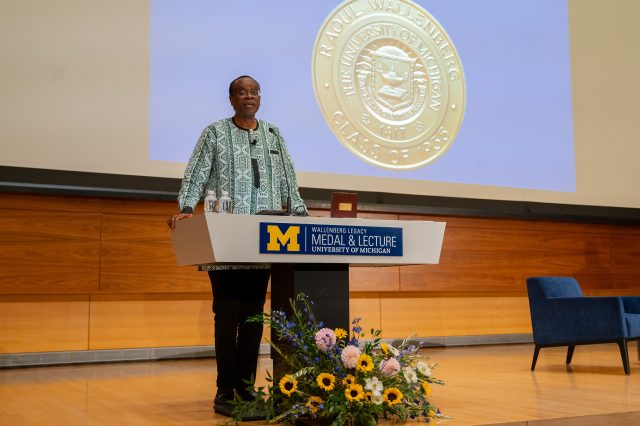[ad_1]
The University of Michigan awarded Nnimmo Bassey, a Nigerian architect, poet and African environmental activist, with the 29th annual Wallenberg Medal Tuesday evening at the Ross School of Business. In addition to accepting the medal, Bassey gave a lecture to an audience of 100 U-M students and community members titled “We Are Relatives” on the intersectionality of humanity, division and unity, and how this impacts environmental justice. The lecture was organized by the Donia Human Rights Center, a forum focused on human rights and intellectual exchange.
The Wallenberg Medal is awarded to those who have shown outstanding work in their field and “acted selflessly without expectation of reward,” according to the U-M Wallenberg Legacy website. The award is named for Raoul Wallenberg, a Swedish-born 1935 graduate of what was then called the U-M College of Architecture, but is now the Taubman College of Architecture and Urban Planning. During World War II, Wallenberg saved thousands of Hungarian Jews by issuing visas and providing safe housing during a mission in Budapest.
Bassey is the executive director of Health of Mother Earth Foundation, a Nigerian-based think tank that is a part of Oilwatch International, a network of organizations and businesses seeking to stop the expansion of fossil fuel extraction in the Global South. The foundation works with sustainable organizations while advocating for environmental climate justice and food sovereignty.
Urban Ahlin, Swedish ambassador to the United States, spoke at the Wallenberg Lecture before Bassey. Ahlin said the medal encourages U-M students to make a positive difference in the world.
“We need more people who embody Wallenberg’s spirit, people who are willing to take a stand, to be courageous, to act with empathy and to be resourceful when challenges arise,” Ahlin said. “And those people are sitting right here, students like you, who have the potential to carry forward these lessons into the future.”
In his lecture, Bassey spoke about the complexity of human relationships, which he believes transcend racial, geographical and cultural boundaries.
“I stand before you as a son of the Earth, reminding myself that this reality holds true a long way before my nationality or race,” Bassey said. “Unlocking our ways of being can have a plurality of nuanced meanings, including who we are internally and who we are relationally as well. Our being is not bound by physical geographies or contrived boundaries, but by complex meanings and manifestations that can be sociocultural, historical, political and spiritual.”
Bassey spoke about the importance of being connected with both the Earth and humanity, while also encouraging global action on the environment.
“And today, I pledge to continue working for power from below and to stress the urgent need to globalize social justice, because we cannot build this needed change one territory at a time,” Bassey said. “We require collective global action, if capital could be globalized, hope should equally be globalized.”
The award show ended with a 30-minute Q&A session for audience questions, which was hosted by Steven R. Ratner, director of the Donia Human Rights Center and a U-M law professor, and Bassey.
Engineering freshman Anvita Verabelli said she attended the event because it was recommended by her ALA 250: Critical Issues for Climate Solutions professor. In an interview with The Michigan Daily, she shared her impressions of Bassey’s acceptance speech.
“I really like the part where he spoke about Ubuntu, which is an African philosophy concept that talks about how interconnected humanity is with the physical world that surrounds us,” Verabelli said. “That was one of my main takeaways, and it also makes me want to visit Nigeria — towards the end especially — and attend more insightful sessions with other environmental activists.”
Verabelli said she was inspired by the idea of courage throughout the lecture, modeled by Bassey and Wallenberg’s stories. Verabelli said she will continue to model that value for herself as she enters her freshman year as an international student.
Ahlin said the Wallenberg Lecture series offers an opportunity for students to become inspired as they start their academic and professional careers.
“So as you walk the same path here at the campus that Wallenberg once did, remember this: He was once in your shoes, unsure of where life would take him, and maybe, just maybe one day, someone will be giving a speech about how you changed the world too,” Ahlin said.
Daily Staff Reporter Chiara Dettin can be reached at chiarald@umich.edu.
Related articles
[ad_2]
Source link











